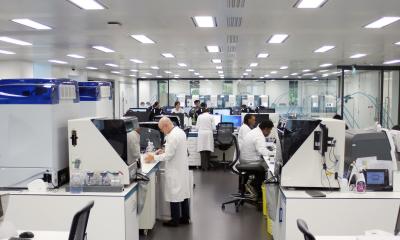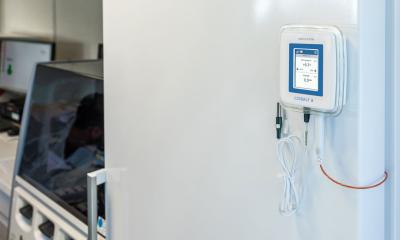
Image source: Adobe Stock/Parradee
Sustainability
Lab-on-a-chip for a low-carbon future
‘The field of lab-on-a-chip needs to meet important challenges around our global targets in sustainability and net zero,’ said Professor Jonathan Cooper, Wolfson Chair of bioengineering at the University of Glasgow, UK. This includes not only the development of smart analytical systems that are able to sense the changes that are occurring within the environment but also, more generally, the mitigation of single-use plastics in analysis and the use of low-power, recyclable microsystem technologies.
In the context of sustainability, most lab-on-a-chip devices are currently single-use, made from plastic materials derived from non-renewable sources and contributing to the burgeoning amounts of medical waste. Whilst some of these devices are disposed of in an environmentally “friendly” manner, these materials increasingly find their way into landfills or rubbish tips.
New biodegradable materials, including those derived from natural sources such as cellulose or paper, may in future replace halogenated plastics such as polyvinyl chloride (with the caveat that natural biopolymers such as cotton present their own environmental risks. ‘The need to examine the whole product life cycle, moving towards a circular economy, will include considering the overall carbon footprint (measured as its quantitative equivalence, eCO2),’ said Cooper.
A recent review provides a comprehensive overview of the “plastic problem”, including the present and future of bioplastics and how their use can pave the way to a more sustainable future, including certain challenges in using bioplastics bearing in mind eCO2 considerations.
Key information provided by expert systems in digital health
The role of expert systems, particularly in digital health, in providing key information at the point of need, where treatment is carried out, will also serve to reduce the overall environmental footprint of measurement systems, reducing transport costs and the burden placed on transport and infrastructure systems.
Similarly, local manufacturing has the potential to contribute to net zero by staying close to where devices are being used. One example being the Diatropix initiative in Senegal, ‘where it is proposed diagnostic devices will be manufactured in Africa, close to where they are needed,’ said Cooper.
Challenges in manufacturing: new rules for sustainability
Thought leaders in lab-on-a-chip will be encouraged to present their opinion on how advances in technologies may impact society in the coming years. ‘Connected to this will be the impact of new sustainable manufacturing technologies that continue to reduce production costs whilst improving product reliability, but not at the expense of the environment,’ said Cooper. Inevitably, new manufacturing technologies will involve optimisation and rationalisation of existing conventional micro- and nano-lithographic methods, as well as the integration of less conventional methods for hybrid lab-on-a-chip manufacturing methods using additive manufacturing methods, such as 3D printing, as well as self-assembly on a nanoscale. (BB)
13.11.2023





